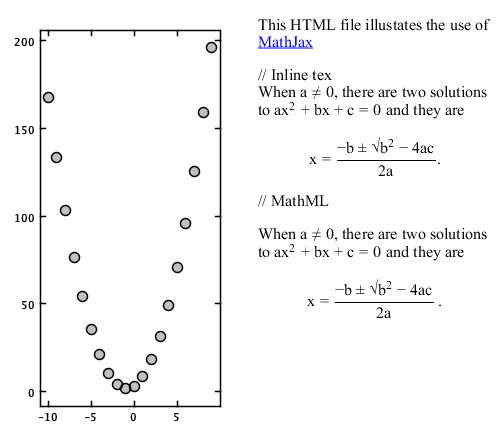JavaFX Examples
These examples illustrate the use of JavaFX with Waterloo charts.This creates a Waterloo graph inside Swing hierarchy and add JavaFX content to a JFXPanel.
package kcl.waterloo.jfx;
import java.awt.EventQueue;
import java.lang.reflect.InvocationTargetException;
import javafx.application.Platform;
import javafx.embed.swing.JFXPanel;
import javafx.scene.Scene;
import javafx.scene.web.WebEngine;
import javafx.scene.web.WebView;
import kcl.waterloo.graphics.GJGraph;
import kcl.waterloo.graphics.GJGraphContainer;
import kcl.waterloo.graphics.plots2D.GJPlotInterface;
import kcl.waterloo.graphics.plots2D.GJScatter;
import kcl.waterloo.swing.GCFrame;
/**
*
* @author ML
*/
public class MathJax {
/**
* This example plots a scatter plot alongside a web page in a
* JavaFX WebView.
*
* The WebView is added to the Swing layout using a JFXPanel.
*
* @param args the command line arguments
*/
public static void main(String[] args) throws InterruptedException, InvocationTargetException {
EventQueue.invokeAndWait(new Runnable() {
// Create the Swing components on the EDT
@Override
public void run() {
GCFrame f = new GCFrame();
GJGraphContainer gc = GJGraphContainer.createInstance(GJGraph.createInstance());
f.add(gc);
// Create a plot a quadratic
double[] x= new double[20];
double[] y= new double[20];
for (int k=0;k<20;k++){
x[k]=k-10d;
y[k]=2d*Math.pow(x[k],2d)+3.5d*x[k]+3d;
}
GJPlotInterface p=GJScatter.createInstance();
p.setXData(x);
p.setYData(y);
gc.getView().add(p);
gc.getView().autoScale();
// Describe the plot in a WebView using MathJax
final JFXPanel jfx = new JFXPanel();
f.add(jfx, 0, 1., 1., 1., 0);
// Add the web page on the JavaFX thread
Platform.runLater(new Runnable() {
@Override
public void run() {
final WebView browser = new WebView();
final WebEngine webEngine = browser.getEngine();
// This is a reference to a web page on the Waterloo web site
webEngine.load("http://waterloo.sourceforge.net/MathJax/mathjax.html");
Scene s = new Scene(browser);
jfx.setScene(s);
webEngine.reload();
}
});
}
});
}
}
